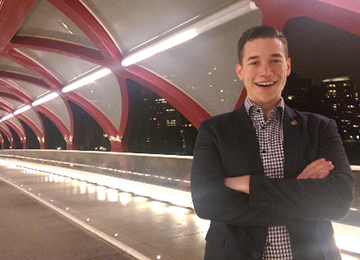

Mark Grady started off in engineering the same way a lot of people did: he liked math and science courses in high school and the next logical step seemed to be a degree in engineering. But once he was done the first year of university, he realized he was driven by something much larger.
“I discovered the impact that an engineer can have on society by having an idea and the scientific background to make it flourish. This is what kept me interested in engineering – the pursuit of making a difference.”
Now in his fourth year of a five-year Bachelor of Chemical Engineering degree at Dalhousie University in Halifax, the native of Eastern Passage, N.S., is bringing that passion to make a difference to his new role as President of the Canadian Federation of Engineering Students (CFES).
The CFES is the national organization that represents approximately 70,000 students from 50 engineering campuses across the country. Amongst their many activities, they organize the CFES Congress, the CFES Conference on Diversity in Engineering and the CFES Canadian Engineering Competition.
“We seek to provide services, foster the exchange of ideas and provide representation for Canadian engineering students.
During his 2015-2016 term as CFES president, Grady hopes to drive the Federation forward by implementing innovative programs and policies to improve both the internal operations of the organization, and the services that they provide to students.
“There are so many things I would like to get accomplished [during my term]. It is an overwhelming, yet enticing and exciting challenge.”
First, Grady would like to make CFES more effective in training student leaders. While CFES has already encountered success in providing training to students at their conferences, Grady feels they can revamp the content from those presentations and deliver them directly to university campuses across Canada, thereby forming a training team within the CFES.
Second, Grady wants to get more students involved in the CFES. With only 22 time-consuming positions currently available on the officer team each year, Grady hopes to create new positions for volunteers, who can be as involved as they wish. Not only will this allow CFES to enhance the services it provides, Grady thinks it will also unite engineering students across the country by getting more people involved at a national level.
Finally, Grady aims to increase the CFES' efforts at student representation. The CFES already has an ongoing relationship with the Engineers Canada Accreditation Board, but Grady hopes to expand this and plans to pursue obtaining an observer seat for the CFES president at Accreditation Board meetings, and eventually, a voting seat.
Grady also has great ideas for how the engineering profession can continue to reach out and engage engineering students, whether it be engineering companies supporting student clubs and engineering societies, or the profession taking on initiatives to support underrepresented individuals and retain a diverse group of students in engineering programs.
Grady hopes that professional organizations like Engineers Canada and the provincial and territorial regulators can create targeted and structured mentorship programs for engineering students to help guide them through their education and career paths.
“Above everything, we aim to improve the Canadian engineering student experience, and we are always looking for new methods of doing just that.”


